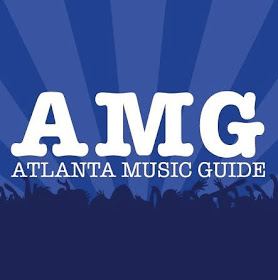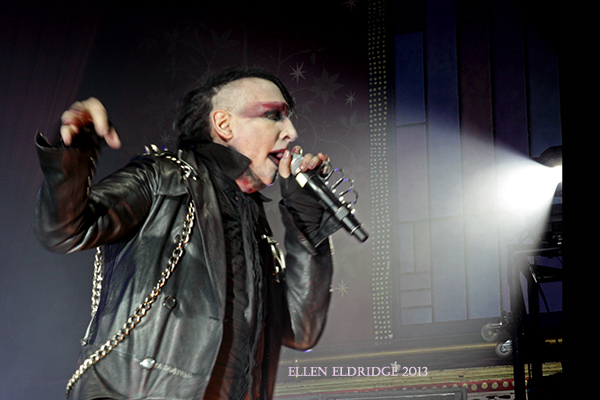Review and Photos by Ellen Eldridge
Marilyn Manson appeared in the mid-1990s as the opening band for Nine Inch Nails alongside the Jim Rose Freak Show. His passion and hunger drove him to break glass against his skull and use the pieces to cut his chest underneath a solitary hanging light bulb. This self-destructive act left blood on the stage and fueled his fans to express themselves en masse to alleviate the inner turmoil many of them felt. Fast forward about 16 years and the fans line up with cell phones in hand ready to snap a shot of a 44-year-old man who seems to still feel his youth, but somehow lost that lust—or hunger.
Manson still hits the high notes in “Angel with the Scabbed Wings” and “Disposable Teens” with fair reliability, and I won’t judge the man for having lost a bit of the energy he had as a 20-something, but I couldn’t help but feel a little underwhelmed at first.
Allow me to backup; Manson was my life when I was in high school. I dressed the part not only at the shows but also everywhere I went. I bought the CDs when Marilyn Manson albums were shoved into the Marillion slot because Sam Goody and other retailers had not yet made Manson a space in the racks. I followed Manson to almost every show in the tri-state area, and I met Manson on his 25th birthday at a show in Allentown, Pa. So, when I say I felt underwhelmed it could be due to the intensity of those early shows.
Still an incredible showman on par worthy of a co-headlining tour with Alice Cooper, Marilyn Manson and his current lineup singed the crowd when the band opened with “Angel with the Scabbed Wings.” After each song Manson changed costumes and usually microphone stands. At first he held a stand shaped like brass knuckles, while “No Reflection” featured Manson holding a butcher knife stand.
When Manson announced he wanted to take the fans back to 1996, I thought that’s the song he would play, but “Little Horn” suited well enough. Honestly, I would have enjoyed hearing at least one song off Portrait of an American Family.
Though I’ve always enjoyed the cathartic nature and expressive outlet of a Marilyn Manson show, my older and perhaps wiser self took umbrage at Manson’s remarks after a weird and warped guitar solo. “That was a test to see if you guys do drugs and I like your style cuz you do,” Manson said before playing “Dope Show,” while wearing a white jacket with a tie that read “DRUGS.” Electronic signs flashed and rotated the word “DRUGS” and I felt like maybe Manson should have more responsibility toward his fans. Though, I often feel that Manson failed to grow up as much as some of his fans from those early years. His failed relationships and marriage may well have added not as much to his wisdom as to his alcoholism. Even Layla Brooklyn Allman admitted with pride that she and Manson share a drink of absinthe before every show on the tour in her 5GB interview with Atlanta Music Guide.
But, I’m not going to bash last night’s show; I feel like the former waitress who judges her server harshly on nights out. Manson still gets my tip. He moves around stage and lights up his fans by reaching for their hands. His continued conversation with the crowd exposes pieces of his inner self, which has always been the best part of a live show.
Manson invited two of his friends on stage, but hinted at the tribute by saying, “I’d like to thank you once again Atlanta…not only do I love you but I feel like I got my start here. The first time I stayed in Atlanta was in a non-homosexual tryst with a friend of mine who you’ll meet later…so I feel like Atlanta is where rock is never dead.” After playing “Rock is Dead,” Manson announced “legendary James Hall,” then called him beautiful several times before playing the sullen yet sadly serene “Dissociative.” Hall and Manson asked the fans to “give it up” for each other in turn and then played “You Want Love,” which Manson referred to as his favorite song ever.
The camaraderie and down-to-earth appreciation by Manson to those who helped him get to where he is showed that as messed up internally as he may or may not be, Manson is an artist who expresses emotion in such a way that fans across the years have gained a sense of community and catharsis. For this reason alone I still call myself a Marilyn Manson fan even when I can’t recognize the band and I feel I’ve outgrown much of the showmanship.
























